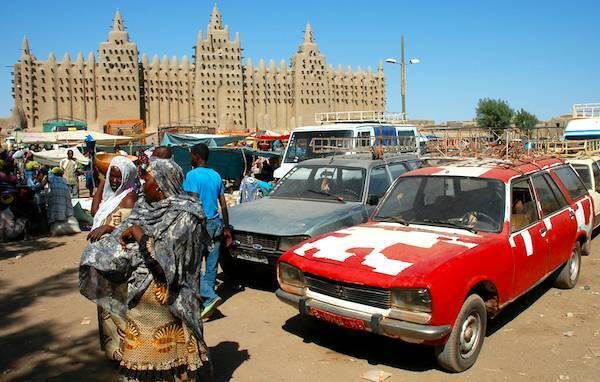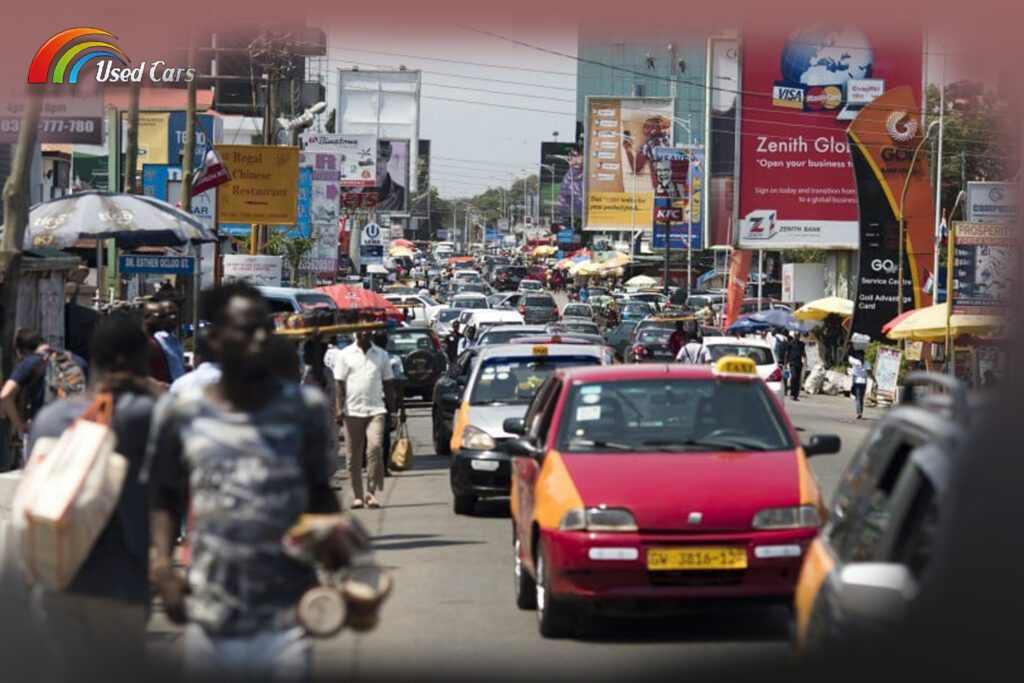With the steady development of the African economy, the rising purchasing power of the population has propelled the growth in demand for cars. Compared to the expensive price tags of new cars, used cars have gradually become the preferred choice for many buyers due to their higher cost-effectiveness and alignment with popular consumer habits. Consequently, the second-hand car market in Africa has seen rapid development, showcasing immense market potential.
While the second-hand car market offers more economical options for buyers, it also demands that buyers possess a certain level of knowledge and skills to ensure the purchase of a used car that meets their needs and budget. So, how can buyers effectively select a used car in Africa and avoid potential risks? This blog will delve into the strategies and methods for selecting second-hand cars in Africa, providing scientifically rational and practical car-buying advice for those intending to purchase used vehicles, making your car-buying journey smoother and obstacle-free!
Table of contents
Purchasing Methods
- Local Used Car Markets
- Online Platforms for Used Cars
Precautions Before and After Buying
- Budget Considerations and Pre-Purchase Research
- Vehicle Condition
- Vehicle History and Maintenance Records
- Fuel Efficiency and Environmental Impact
- Effective Communication with Sellers
- Attention to Contract Signing and Transaction Safety
Common Issues and Solutions When Buying a Used Car
- Legality
- Theft and Robbery Risks
- Price Rationality
- Used Car Policies in Various Countries
- Nigeria
- South Africa
- Egypt
- Algeria
- Morocco
Conclusion
Methods of Purchasing Used Cars
Buyers may encounter various channels when making a purchase, such as private sellers, car dealerships, used car websites, and auctions. You can compare these sources to find the most reliable and suitable vehicle. The recommended method of purchase in this blog is to visit local used car markets or buy from used car websites.
Local Used Car Markets
- Firstly, local used car markets offer a wide range of options. These markets typically gather second-hand vehicles from different countries, brands, and models, ranging from economical compact cars to luxury sedans. Buyers can find their desired vehicle models in these markets according to their needs and budget. Additionally, due to market competition, vehicle prices are generally more reasonable.
- Furthermore, local used car markets also offer flexibility and convenience. Many of these markets provide one-stop services, including vehicle inspection, transfer procedures, maintenance, and repairs, which greatly facilitate buyers. Buyers can complete all the purchasing processes in one place, saving time and effort. Additionally, used car markets are often located in conveniently accessible areas, making it convenient for buyers to come and choose vehicles.
- Under government oversight, the scrutiny and transactions of vehicle sources in the used car market become more stringent and reliable. The government also increases supervision of the used car market to safeguard buyers' rights and provide robust protection for the market's sound development.
Online Platforms for Used Cars
- In general, to ensure the authenticity and reliability of vehicle information on a used car website, all uploaded vehicles must come with relevant documentation and undergo strict scrutiny and investigation by the website's professionals.
- Additionally, users can access detailed vehicle data and actual photos on the website to gain a more comprehensive understanding of the vehicle's condition. If you've already identified a desired model on the online platform, consider test-driving it at the website's offline location.
This way, you can experience firsthand the driving feel of the vehicle, offering a more convenient and efficient option. These websites might be useful for you:
Precautions Before and After Buying
The methods buyers use to select used cars may vary due to differences in regions, cultures, and economic conditions. However, some universal principles and steps apply across many countries on the African continent. Here are several aspects to consider when selecting a used car:
Budget Consideration and Pre-Purchase Research
Each person's financial situation varies, so budget is the primary factor to consider when purchasing a used car. We need to set a car budget based on our financial capabilities and needs, allowing us to quickly identify suitable vehicles within this budget range and save time during the selection process. Buyers are advised to research the prices of desired used car brands and models in advance, gain a comprehensive understanding of the market conditions, and determine a reasonable price range.
Vehicle Condition
- When purchasing a used car, conducting a comprehensive inspection of the vehicle's condition and performance is crucial. It's also essential to consider the vehicle based on the specific conditions in Africa. Firstly, pay attention to whether the vehicle's exterior is in good condition and if interior features such as the dashboard are functional. Secondly, inspect critical components such as the engine, tires, chassis, and suspension system.
- Secondly, when selecting a second-hand car, buyers must consider the durability and reliability of the vehicle. Due to the relatively underdeveloped infrastructure and diverse road conditions across the African continent, a used car capable of withstanding harsh road conditions and adapting to various climate conditions becomes the preferred choice.
- The safety of the vehicle cannot be overlooked. Due to the higher rate of traffic accidents in Africa, the safety performance of the vehicle is crucial. When selecting a used car, a comprehensive inspection of its safety features such as braking system, airbags, seatbelts, etc., should be conducted.
If possible, it is advisable to invite professionals to accompany the inspection to ensure the safety and reliability of the vehicle. It's best to conduct a test drive before purchasing to assess the vehicle's driving performance and comfort.
Vehicle History and Maintenance Records
Understanding the vehicle's maintenance history is crucial for assessing its overall condition and reliability. Prior to purchase, it's important to inquire with the seller or check the vehicle's maintenance history, ensuring there are formal records of repairs. This helps in determining if there are any underlying issues with the vehicle, thereby avoiding the purchase of a car with a history of serious accidents or frequent repairs. Additionally, it's important to remain vigilant about the vehicle's manufacturing year and mileage to ensure that the purchased used car can continue to operate reliably in the foreseeable future.
Fuel Efficiency and Environmental Impact
With the increasing environmental awareness across African countries and the instability of fuel prices, fuel economy and environmental friendliness have become important factors to consider when purchasing a vehicle. This means that when choosing a used car, it is necessary to consider not only its fuel consumption level but also whether its emission standards comply with local environmental protection requirements. Additionally, considering the geographical features and traffic conditions of the African continent, a used car with good off-road performance and low fuel consumption may be more suitable.
Effective Communication with Sellers
Effective communication with the seller is an essential part of the car-buying process. Understanding information such as the vehicle's history, usage, and the seller's reason for selling can help assess the vehicle's reliability and the seller's credibility. Additionally, when negotiating the price with the seller, it's important to remain calm and rational, avoiding being swayed by excessively high prices or sacrificing the quality and safety of the vehicle in pursuit of a lower price.
Attention to Contract Signing and Transaction Safety
- Carefully read the contract: Before signing the purchase contract, it is essential to carefully read the terms to ensure that all content aligns with the agreement of both parties. If there are any doubts, consulting with a professional or a lawyer is advisable.
- Verify Vehicle Information: Check the vehicle information listed in the contract, such as model, specifications, color, etc., to ensure it matches the vehicle you are purchasing.
- Ensure Transaction Safety: It is advisable to choose reputable automotive dealerships for vehicle purchases to ensure transaction safety.
- At the same time, when making a deposit or full payment, be sure to request an official invoice and receipt for future warranty claims.
In conclusion, negotiating the car price requires thorough preparation, maintaining composure, employing negotiation skills, and paying attention to contract signing and transaction safety.
Common Issues and Solutions When Buying a Used Car
Legality
First and foremost, legality is a crucial aspect to consider when purchasing a used car. Before making a purchase, buyers should carefully verify whether all the vehicle documents and procedures are complete. This includes the vehicle's registration certificate, vehicle registration documents, purchase invoice, and so on. If the vehicle's documentation is incomplete, there may be risks of illegal modifications, theft, and other issues, leading to unnecessary trouble and losses for the buyer. If an individual buyer intends to purchase a used car imported from abroad, it's also essential to understand the relevant policies on used car imports before proceeding.
Theft and Robbery Risks
Secondly, the risk of purchasing stolen or robbed vehicles is also a concern when buying a used car. Some criminals may exploit the information asymmetry in the used car market to resell stolen or illegally obtained vehicles. Therefore, buyers should choose reputable car markets or trading platforms when purchasing a used car, and carefully inspect the vehicle's VIN (Vehicle Identification Number) and engine number to confirm the vehicle's identity and source, verify vehicle information, and reduce the risk.
Price Rationality
Furthermore, when purchasing a second-hand car, attention should also be paid to pricing issues. Buyers should assess the value of the vehicle based on the used car market conditions and the actual condition of the vehicle to avoid being misled by overpriced or underpriced vehicles. Additionally, attention should be given to warranty and after-sales service issues to ensure timely maintenance and support during use.
Used Car Policies in Various Countries
Understanding the used car policies in your own country is crucial before purchasing a used car. Regulations and standards may vary from country to country, directly impacting your car buying experience and future vehicle usage. In this blog, we will briefly introduce the used car policies of several African countries, including Nigeria, South Africa, Egypt, Algeria, and Morocco.
- Nigeria:
Ban on Importing Older Vehicles: The government has banned the importation of older vehicles exceeding a certain age limit to improve automotive quality and safety standards.
Enhanced Inspection Standards: More stringent inspection standards are enforced on imported and sold used vehicles to ensure compliance with relevant safety and environmental standards.
- South Africa:
Vehicle Registration and Ownership Transfer: After purchasing a car, ownership must be transferred to the buyer's name, and the vehicle registration must be completed.
Vehicle History Check: It is advisable to conduct a vehicle history check to ensure the vehicle is free of encumbrances and legal issues. Vehicle Inspection and Safety Standards: There are strict requirements for vehicle safety and environmental standards, and buyers may need to undergo vehicle inspections.
- Egypt
Import Restrictions: The government imposes high tariffs and other restrictions on imported used vehicles to encourage the purchase of domestically produced or new vehicles.
Vehicle Inspection: Imported vehicles must undergo inspection to ensure compliance with local technical requirements and regulations. Algeria
- Algeria
High tariffs: High tariffs are imposed on imported used vehicles to encourage the purchase of domestically manufactured or new vehicles.
Local automotive manufacturing industry: The government has taken measures to support the development of the local automotive manufacturing industry.
- Morocco
Traffic Policies: Implementing specific traffic policies, such as restricting entry into urban areas for old vehicles or imposing punitive taxes on the use of old vehicles.
Before purchasing a used car, it is essential to understand the second-hand car policies of your own country to avoid unnecessary trouble and risks. Additionally, seeking assistance and advice from professionals during the purchasing process is recommended to ensure smooth transactions that comply with relevant regulations.
Conclusion
In conclusion, purchasing a used car is a decision that requires careful consideration, involving various factors such as durability, reliability, fuel efficiency, safety, comfort, and price. During this process, you need to leverage your knowledge and resources to make informed decisions, ensuring that the used car you buy meets your needs and provides long-term value. With the sustained development of the African economy and the improvement of people's living standards, it is believed that the used car market will become more prosperous and diversified in the future, offering African buyers more choices. We hope that the above guide will provide helpful assistance for your car-buying journey.



